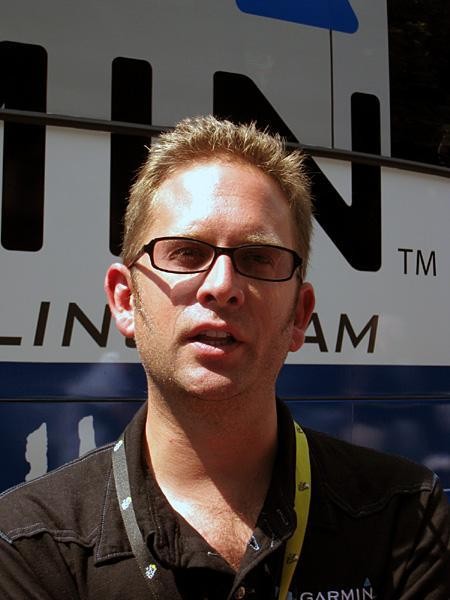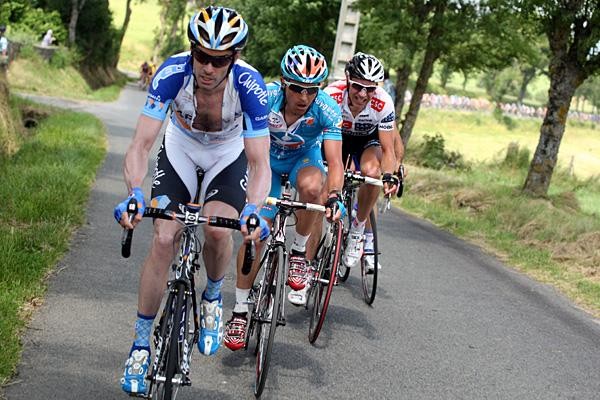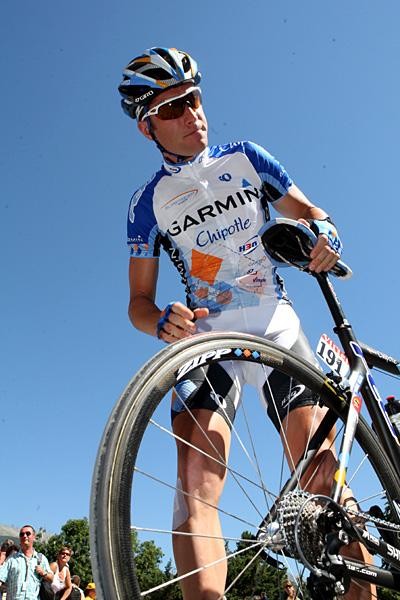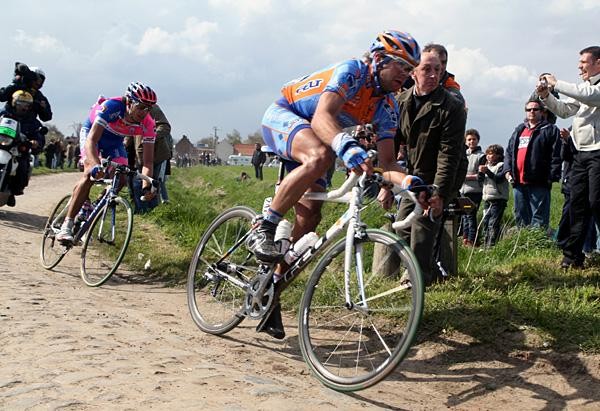Garmin: Work is a four-letter word – part two
Garmin-Chipotle's very existence relies on hard work. Its bosses, directors and riders epitomise an...




News Feature, October 23, 2008
Garmin-Chipotle's very existence relies on hard work. Its bosses, directors and riders epitomise an ethos focusing on grafting their place in a peloton fighting for credibility. Thanks to great performances in 2008, the team has become a model for a more credible sport where the words 'clean' and 'win' are mixed more easily, as Cyclingnews' Les Clarke discovers.
In this second part Cyclingnews finds out how the team's work is gradually counter-attacking the damage done by the scourge of doping. (Read part one for more.)
"Some of these guys just don't believe that they can perform at that level clean, and maybe they can't," says Garmin's Team Manager Jon Vaughters when asked how the team reacts to positive doping results such as those of Riccardo Riccò or Stefan Schumacher. For a squad which has immersed itself in the clean message so thoroughly, surely this is a slap in the face?
"I think that some of these guys believe that's what they need to perform; I don't think they believe the culture of anti-doping. They hear our team saying, 'we're clean, we're doing internal controls, etc' they say, 'Sure you are, whatever...' They just don't believe it, and they're just cynical about it," says Vaughters.
"They think everyone else is still doing it, and since they think everyone is still doing it they just do it themselves. I just think that it's false – I think those doing it are in the minority right now."
The latest news surrounding Bernard Kohl's use of CERA to win the king of the mountains title and third place overall at this year's Tour de France means that Christian Vande Velde should be promoted to fourth, a la Oscar Pereiro's 'victory' in 2006. On that occasion, Vande Velde's then-teammate, Carlos Sastre, moved up to third overall. But none of the podium could celebrate on the correct step in Paris.
Get The Leadout Newsletter
The latest race content, interviews, features, reviews and expert buying guides, direct to your inbox!
Vaughters explained that it's for this reason that riders such as Vande Velde and David Millar feel mostly anger.
"If anything, Christian's reaction to this wasn't, 'Oh goody, I moved up a place in the Tour de France,' or Dave Millar didn't say, 'Schumacher [positive]? I then took second in a time trial at the Tour.' They're reaction is more of anger. They don't want to retroactively get on the podium or win a stage; they want to do it on the day... There's really no glory in doing it four months after it's happened.
"It's just sad that these guys don't want to believe that the rest of the cycling world, or at least a lot of us, is trying to move in that direction. The cynicism is still there."
Doing the work
Vaughters really does believe that the majority of those involved in the sport are doing their best to clean up cycling. His charge, Trent Lowe, agreed and explained that a generational change may have brought a better mentality to the peloton.
"There's a much better work ethic coming through with a lot more teams... There's a lot better work ethic emerging whereby guys work harder on their technique and go to the gym more. These types of things are being instilled at an earlier stage – going to the gym, working hard, training hard and doing the fundamental things with diet – which will come to fruition."
Having ridden his first Tour de France this year, Lowe said the blight of doping scandals throughout the three weeks did not overly perturbed him. He instead preferred to concentrate on what his team had in store for its riders. His response was also a sign of the maturity that has been a hallmark of his career so far.
"It wasn't something that really got to me at all; you're just out there doing your job. You prepare as thoroughly for the race as possible, and I hadn't done it before so I had to take it as it came. There's nothing to compare it to.
"Every morning there's a meeting with the team, so you're aware of the team's objectives and the need to focus just on those. You can't change other people's objectives; that's their deal, and they have their own meeting to do their own thing."
Power testing
Having a heavy involvement with the Agency for Cycling Ethics (ACE) programme and instituted a strict anti-doping policy within the very structure of Garmin-Chipotle, Vaughters explains that Garmin's approach is at the forefront of combating drugs in sport. This comes in light of comments from USA's Greg LeMond suggesting that power metre output data and blood profiling could be used together to catch cheats.
"Initially, when Allan [Lim] and I were talking about getting the ACE thing together, we didn't actually say that you can correlate changes in red blood cell mass with changes in power output, and if you see an increase in power output that correlates with an increase in red blood cell mass, then that's really suspicious."
It was at this point in our interview where Vaughters' informed approach to the problem of doping came to the fore. He was speaking as a man who had witnessed the effects of drugs in the peloton during his career and knew what was at stake when it came to ensuring they didn't become a part of his team.
In an era when it's common to hear team managers telling the press that they knew nothing about their riders' misdemeanours, it's refreshing to listen to a manager who is willing to take responsibility for what his riders do – because he knows what they're capable of when the stakes are high.
"We never actually got to the point where we were able to plug in the power data with the anti-doping testing we had going on. At the same time, however, all that information is available and I can say with 100 percent surety that Christian's blood tests from the AFLD [French anti-doping agency], ACE and the UCI Passport Program have been published in the Wall Street Journal, and his power records have been published on our website as well.
"The information is out there; I guess I never thought of it in the context that Greg is thinking... it's one of those things that I'm not sure you can do alone with just power. You'd want to see a change in haematology that correlated with a change in power. VO2 max on its own – just saying there's been a jump in power and therefore that must be the result of doping... I think you need to see some metabolic and hematological changes that correlate with that."
In terms of his star rider's performance at the Tour, Vaughters said, "It's interesting, Christian never sustained more than six watts per kilogram at any point in the Tour; sustained meaning over a 30-minute period. To me that speaks volumes as to the cleanliness of the racing.
"It's just something that Christian has been capable of his entire career. He hasn't always done it, and in the past he's been heavier than he is right now – he got smaller this year – but in essence he was a bit more aerodynamic, a little bit lighter, more confident and working for himself rather than other people. You place those aspects together and just do the same power output you've done all your career, and boom, there you go."
The right mix
Integral to this was the selection of riders the team had at its disposal. Vaughters explained it serves as an appropriate summary of what the team is all about. "We've been really careful with recruiting, who we recruited, how their personality fit in... I read some comments online sometimes where people say, 'They need another Classics rider, they need a climber, they need a sprinter...'
"Those are criticisms I sometimes take to heart. I realise that maybe there's a point, but what people don't realise is that the reason we're so good at 'unity' events like the team time trial or days that the team really has to sacrifice itself to keep things together is because I've chosen personalities that are compatible and can see the bigger picture – intelligent riders. We don't really have any big heads.
"I've chosen guys like Trent, who is a solid person and willing to do everything in his training to succeed and work as hard as he possibly can; whether success means it's for a teammate or himself, it doesn't matter. We always operate as a unit – there's a lot you can do in terms of training camps and team bonding that helps that along.
"At the end of the day it's the people you pick in the beginning who really allow that to happen. Quite frankly, we didn't pick any mercenaries. We picked guys who wanted to be part of something bigger than just themselves alone."
(Read Garmin: Work is a four-letter word – part one.)
For more on Garmin and Vaughters, read: